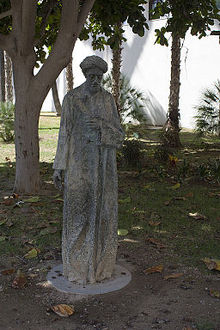Solomon ibn Gabirol
[1]: xxxii [4] As such, ibn Gabirol is well known in the history of philosophy for the doctrine that all things, including soul and intellect, are composed of matter and form ("Universal Hylomorphism"), and for his emphasis on divine will.[8] A second legend[11] relates that he was murdered by a Muslim poet who was jealous of Gabirol's poetic gifts, and who secretly buried him beneath the roots of a fig tree.The 15th-century Jewish philosopher Yohanan Alemanno imported that error back into the Hebrew canon, and added another four works to the list of false ascriptions.[1]: xxx In 1846, Solomon Munk discovered among the Hebrew manuscripts in the French National Library in Paris a work by Shem-Tov ibn Falaquera.Munk concluded that Avicebron or Avencebrol, who had for centuries been believed to be a Christian[6] or Arabic Muslim philosopher,[4] was instead identical with the Jewish Solomon ibn Gabirol.[1]: xxxi Gabirol made his mark on the history of philosophy under his alias as Avicebron, one of the first teachers of Neo-Platonism in Europe, and author of Fons Vitæ ."[3] The work stands out in the history of philosophy for introducing the doctrine that all things, including soul and intellect, are composed of matter and form, and for its emphasis on divine will.[3] In the closing sentences of the Fons Vitæ (5.43, p. 338, line 21), ibn Gabirol further describes this state of “return” as a liberation from death and a cleaving to the source of life.For example, the eighty-third line of the poem points to one of the teachings of the Fons Vitæ; namely, that all the attributes predicated of God exist apart in thought alone and not in reality.[9] Moses ibn Ezra is the first to mention Gabirol as a philosopher, praising his intellectual achievements, and quoting several passages from the Fons Vitæ in his own work, Aruggat ha-Bosem.[9] Abraham ibn Ezra, who cites Gabirol's philosophico-allegorical Bible interpretation, borrows from the Fons Vitæ both in his prose and in his poetry without giving due credit.[15] Pride Meekness Pudency Impudence Love Hate Mercy Hard-heartedness (cruelty) Wrath Good-will (suavity) Jealousy Wide-awakeness Joy (cheerfulness) Grief (apprehensiveness) Tranquillity Penitence (remorse) Liberality Miserliness Valor Cowardice The Improvement of the Moral Qualities, originally written in Arabic under the title Islah al-Khlaq (Arabic: إصلاح الأخلاق), and later translated by Ibn Tibbon as (Hebrew: "תקון מדות הנפש", pronounced [ti."[9]: Ethical Treatise It was composed by Gabirol at Zaragoza in 1045, at the request of some friends who wished to possess a book treating of the qualities of man and the methods of effecting their improvement.[17] It was originally published, along with a short commentary, in Soncino, Italy, in 1484, and has since been re-worked and re-published in many forms and abridged editions (e.g. Joseph Ḳimcḥi versified the work under the title "Shekel ha-Kodesh").[9] Gabirol wrote both sacred and secular poems, in Hebrew, and was recognized even by his critics (e.g. Moses ibn Ezra and Yehuda Alharizi) as the greatest poet of his age.

MálagaCaliphate of CordobaValenciaTaifa of ValenciaToledoMedieval philosophyJewish philosophySchoolNeoplatonismReligious philosophyHebrewromanizedArabicJewishphilosopherNeo-PlatonicAl-AndalusLatinizedHylomorphismCaesarea, Israellupus vulgarisMoses ibn EzraCórdobaZaragozaassassinatedGranadaSamuel ibn Naghrillahazhara613 commandmentsJudaismHai GaonJudah ben Saul ibn TibbonacrosticModern HebrewSpanishJabir ibn AflahSolomonYohanan AlemannoSolomon MunkFrench National LibraryShem-Tov ibn FalaqueraHellenisticHasmoneanSadduceanPhariseeBoethusianAristobulus of AlexandriaPhilo of AlexandriaMedievalBrethren of PurityIbn Bajjah (Avempace)Ismaili philosophyJewish KalamKabbalahRabbinic JudaismHasdai ibn ShaprutAbraham bar HiyyaBahya ibn PaqudaJudah HaleviAbraham ibn DaudJoseph ibn TzaddikAbraham ibn EzraMaimonidesNachmanidesSamuel ibn TibbonJoseph ben JudahGersonidesMoses of NarbonneIsaac ben SheshetHasdai CrescasJoseph AlboElia del MedigoJudah MinzIsaac AbarbanelJudah Leon AbravanelNatan'el al-FayyumiMansur ibn Sulayman al-GhamariIsaac IsraeliSaadia Gaonal-MukkamasHibat Allah Abu'l-BarakatIbn KammunaKabbalistKaraismTalmudicTosafistModernOrthodoxSephardicChabadChassidicConservativeReformExistentialistReconstructionistHolocaustRenewalNeo-HasidicMussarRambamistFrancisco SanchesUriel da CostaBaruch SpinozaSalomon MaimonJoseph Solomon DelmedigoElijah Ba'al Shem of ChelmEliezer ben Elijah AshkenaziTzvi AshkenaziJacob EmdenSamuel HirschShneur Zalman of LiadiSimcha Bunim of PeshischaSamson Raphael HirschJacob AbendanaIsaac CardosoDavid NietoIsaac Orobio de CastroMoses MendelssohnSamuel David LuzzattoElijah BenamozeghMoses HessEliezer BerkovitsEliyahu DesslerMonsieur ChouchaniEmmanuel LevinasMartin Buber
